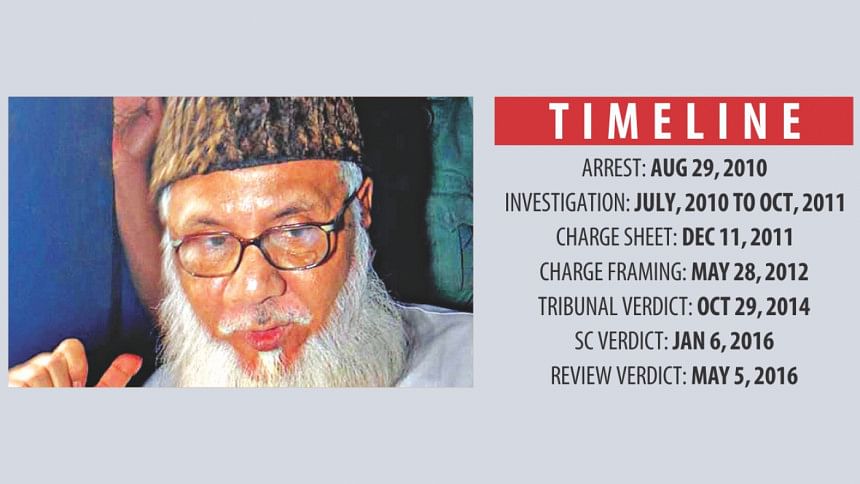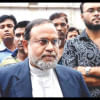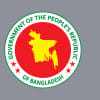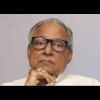NO to war criminal NIZAMI'S plea

The legal battle in the war crimes case against Motiur Rahman Nizami has finally drawn to a close after 69 long months.
The man, who led the ruthless militia Al-Badr in the massacre of Bangalees including intellectuals and professionals during the 1971 Liberation War, has now only one option left -- seeking presidential clemency by confessing to the crimes he committed during the nine-month war.
The Supreme Court yesterday dismissed the Jamaat-e-Islami chief's petition for reviewing its verdict that upheld his death penalty awarded by the International Crimes Tribunal-1 in 2014.
"Dismissed," pronounced Chief Justice Surendra Kumar Sinha in a packed courtroom, paving the way for the execution of the former minister.
As per the precedents set in previous executions of war crimes convicts, it is expected that after the SC's dismissal of the petition, the court will release the full text of the verdict and send it to the tribunal.
The copies of the verdict will be sent to the jail authorities and the district magistrate in Dhaka. The jail authorities will then ask the condemned war criminal if he would seek presidential clemency within a "reasonable time".
If Nizami, now 73, seeks mercy, his plea would go to the president through the home ministry.
If he refrains from seeking clemency, the jail authorities would take preparations for his execution.
Talking to reporters at his office yesterday, Law Minister Anisul Huq said the procedures followed in previous cases will be applicable this time as well.
However, it cannot be said for sure how many days it will take to complete all the procedures for the execution.
Jamaat leader Mohammad Kamaruzzaman was executed five days after the dismissal of his review petition while Salauddin Quader Chowdhury and Ali Ahsan Mohammad Mojaheed were hanged after three days.
Abdul Quader Mollah was hanged hours after the jail authorities received a short SC order on his review petition.
Jamaat leaders Quader Mollah and Kamaruzzaman, who were executed on December 12, 2013 and April 11 last year respectively, did not seek presidential clemency.
Jamaat leader Mojaheed and BNP's Salauddin were executed on November 22 last year after the president turned down their mercy petitions. However, their families claimed that the duo did not seek mercy.
Nizami was the president of Jamaat's student wing Islami Chhatra Sangha from 1966 to September 1971 and ex-officio chief of Al-Badr.
He masterminded the formation of the militia that unleashed terror on peace-loving Bangalees, killed unarmed civilians, raped women and destroyed properties during the 1971 war.
Towards the end of the war, the Al-Badr Bahini committed “crimes of serious gravity intending to demean the human civilisation”, said the Tribunal-1 in its 2014 verdict.
Sensing Pakistan's imminent defeat, the notorious force systematically rounded up, tortured and killed the nation's brightest luminaries to intellectually cripple the soon-to-be independent Bangladesh.
The Jamaat-e-Islami ameer has never repented of the cold-blooded savagery.
Instead of getting punished for the heinous crimes, Nizami was rehabilitated after 1975. He gained immense political clout and even became a minister during the BNP-led government's tenure between 2001 and 2006.
But justice caught up with him in October 2014, when the Tribunal-1 sentenced him to death for the war crimes, and the SC on January 6 this year upheld the death penalty. Nizami filed a petition with the SC, seeking review of his conviction and sentences against him.
The apex court heard Nizami's petition on Monday and fixed yesterday for passing the order.
The four-member SC bench headed by Chief Justice Surendra Kumar Sinha took their seats in the courtroom at 11:31am yesterday amid tight security. Within a minute, the chief justice pronounced "dismissed" and left the courtroom with his colleagues.
Nizami is now in the condemned cell of Kashimpur Central Jail-2. He learned about the ruling from a radio bulletin, reports our Gazipur correspondent. “After hearing the verdict, he seemed restless and worried,” Nasir Ahmed, jailer of Kashimpur Jail-2, told The Daily Star.
A few hours after the verdict, Jamaat-e-Islami called a 24-hour countrywide hartal for Sunday for what it said was the government's conspiracy to kill Nizami.
The government has rescheduled the Higher Secondary Certificate (HSC) and its equivalent examinations scheduled for Sunday due to the hartal.
Sunday's examinations under the eight general education boards and technical education board will be held on Monday and the tests under madrasa education board on May 22, a top official of Dhaka Education Board told The Daily Star yesterday.
REACTIONS
"We got justice after 45 years of wait. Now we're waiting for his execution," said Johurul Haque, a prosecution witness and also a freedom fighter of Pabna where Nizami committed crimes against humanity in 1971.
Expressing satisfaction over the apex court's decision, Attorney General Mahbubey Alam said, "The nation has been served justice."
After Mojaheed, Nizami would be the second man to walk the gallows for killing the brightest minds of the nation, the attorney general said, adding that it is the government that will fix the execution date.
War crimes tribunal prosecutor Tureen Afroz said, "With today's verdict, a chapter in the trial of the top war criminals of 1971 comes to an end."
She also said, "Truth has been established through the verdict. Now we are waiting for SC's full verdict and Nizami's execution."
Khandker Mahbub Hossain, Nizami's principal lawyer, said his client was tried and sentenced under a law -- International Crimes (Tribunals) Act 1973 -- which was actually meant for trying Pakistani army men who committed crimes in 1971.
The government amended the act with "a specific intention" to try civilians, and his client was tried under the law with "doctored testimonies", he said. "So I have nothing to say about this verdict."
Asked whether Nizami will file a mercy petition, the lawyer said it's the Jamaat leader's personal decision. “I've got nothing to do with this,” he told reporters.
The ruling Awami League welcomed the verdict while the BNP kept mum like it did in the past after delivery of judgments in war crimes cases against other Jamaat leaders.
Addressing a press conference at the AL president's Dhanmondi office, HT Imam, prime minister's adviser on political affairs and Awami League Advisory Council member, expressed satisfaction over the verdict.
"People's expectations have been fulfilled through upholding the death sentence of Nizami by the Appellate Division," said HT Imam.
Different socio-political and cultural organisations hailed the verdict and brought out processions in different parts of the country.
Meanwhile, Amnesty International said Bangladeshi authorities should halt the execution of Nizami and impose a moratorium on the death penalty.
"We're dismayed that the Supreme Court has upheld the conviction and death sentence against Motiur Rahman Nizami. The victims of the horrific events of the 1971 Liberation War deserve justice, but the death penalty is not the answer,” said Jameen Kaur, Amnesty International's campaigns director for South Asia, in a statement.
"Taking another life will just perpetuate the cycle of violence. We urge the Bangladeshi authorities to halt this execution immediately, and impose a moratorium on the implementation of the death penalty with a view to its eventual repeal.”

 For all latest news, follow The Daily Star's Google News channel.
For all latest news, follow The Daily Star's Google News channel. 








Comments